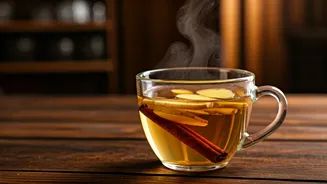Traditional Herbal Remedy
Consultant dietitian Garima Goyal observed that Soha Ali Khan's preference for using tea to relieve PMS cramps aligns with a well-established traditional
method. This method relies on herbs to alleviate menstrual discomfort. This approach has been practiced widely for many years and is based on the belief that natural ingredients can offer relief from various symptoms associated with PMS. The tea's popularity stems from its gentle nature, making it a viable option for those looking for a natural approach to self-care during menstruation.
Tea Ingredients Benefits
The tea typically includes ginger, cinnamon, and honey, each offering specific benefits. According to Goyal, ginger is a common choice because it contains gingerols, which possess anti-inflammatory properties and may help reduce cramps. Cinnamon contributes by adding warmth and flavour. Honey serves as a natural sweetener, and has soothing qualities. Combined in a warm tea, these ingredients may collectively assist in reducing cramps, enhancing digestion, and promoting relaxation during PMS. However, it's crucial to acknowledge that this tea doesn't substitute professional medical treatment for severe period pain, but rather, is a supplementary self-care practice.
Ginger's Anti-Inflammatory Action
Ginger is a key component, known for its ability to combat inflammation. Goyal highlights the presence of gingerols within ginger, which are the active compounds responsible for this effect. This natural anti-inflammatory action plays a significant role in helping to alleviate menstrual cramps. The anti-inflammatory effects of ginger can ease the muscle contractions in the uterus that cause period pain. Thus, ginger tea provides a natural and potentially effective method for easing discomfort, especially for those experiencing mild to moderate PMS symptoms, as noted by experts.
Gentle Supportive Role
Goyal emphasizes the supportive role of the tea as an addition to self-care practices. The tea is intended to complement, not replace, medical treatments. It can provide a sense of comfort and support during PMS. This gentle approach helps in managing the symptoms without relying solely on medications, offering a natural and holistic choice. It also encourages individuals to incorporate self-care strategies into their routine, recognizing the importance of holistic well-being during the menstrual cycle.












